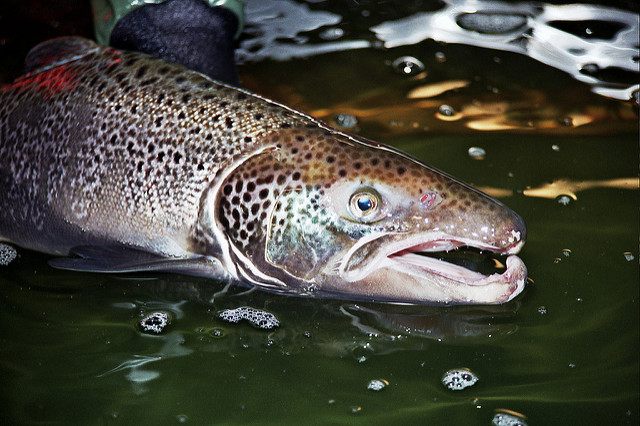A Salmon Pen Collapsed, and Fishers Are Needed to Save the Day
Authorities are asking people to catch as many salmon as possible.

Fishermen and women are often inadvertently saving the day—usually by being in the right place at the right time—whether they’re freeing whales from nets, untangling seal pups from rope, or rescuing various land animals (including people) from drowning.
Right now, though, a massive Atlantic salmon spill off of Washington’s San Juan Islands is giving anglers the opportunity to be heroes by doing what they do best: catching actual fish.
The errant fish escaped from a net pen owned by Cooke Aquaculture Pacific, according to the Seattle Times. The pen “imploded” around 4:00 p.m. on Saturday, August 19. While the company blames extra-high tides from the solar eclipse, environmentalists and others argue that Saturday’s tide, which topped out at 7.9 feet, was not unusually high.*
Solar eclipse’s high tides break net, dumping up to 305,000 Atlantic salmon into waters near San Juan Islands: https://t.co/ik1imRXU3U pic.twitter.com/a2xq0FP9sQ
— The Seattle Times (@seattletimes) August 22, 2017
Native American fishers from the Lummi Nation discovered the breach over the weekend when they went out looking for chinook salmon and instead pulled up net after net of the farmed Atlantic variety—a decidedly foreign fish, and one that could harm native species.
The tides also damaged anchor lines and service walkways, so it has been impossible for employees to even figure out the extent of the damage. No one is sure how many of the 305,000 fish originally in the pen made it out, although experts estimate between 4,000 and 5,000 fugitives.
The only thing certain is that it’s too many, which is where the fishers come in. “The department is urging recreational fishers to get as many of the Atlantic salmon as possible,” the Times writes. While you still need a license to go out there, there’s no limit on how many salmon you can take, and you don’t even need to record your catch. Sometimes doing the right thing can be delicious.
*This post and its headline have been updated to reflect the fact that the accident may not have been caused by the eclipse.











Follow us on Twitter to get the latest on the world's hidden wonders.
Like us on Facebook to get the latest on the world's hidden wonders.
Follow us on Twitter Like us on Facebook